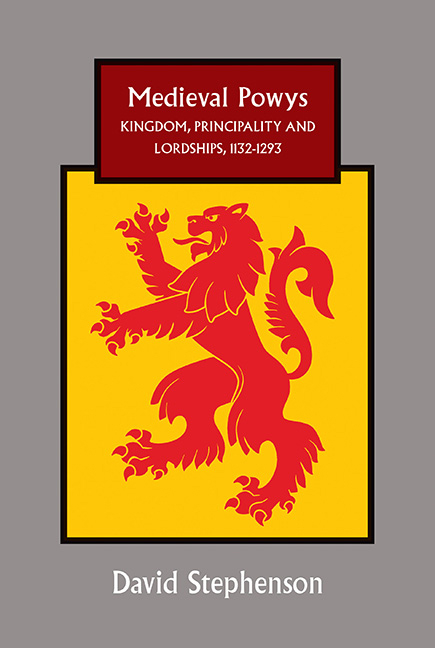Book contents
- Frontmatter
- Dedication
- Contents
- List of Illustrations
- Acknowledgements
- Abbreviations
- Map
- Miscellaneous Frontmatter
- Introduction: The problem of medieval Powys: historiography and sources
- Part I Powysian Polities in the Twelfth and Thirteenth Centuries: A Political Narrative
- 1 The re-emergence of Powys
- 2 The age of eminence: Madog ap Maredudd
- 3 Crisis and renewal: 1160 and its aftermath
- 4 The ascendancy and fall of Gwenwynwyn
- 5 Eclipse: the supremacy of Gwynedd
- 6 Survival: the case of Gruffudd, lord of Bromfield
- 7 Survival: the case of Gruffudd ap Gwenwynwyn
- 8 The persistence of Powysian lordship: Owain ap Gruffudd ap Gwenwynwyn and the descendants of Madog ap Maredudd
- Part II Characteristics of the Powysian Polities: Structures, Fault-Lines and Political Culture
- Appendices
- Select bibliography
- Index
- Miscellaneous Endmatter
4 - The ascendancy and fall of Gwenwynwyn
from Part I - Powysian Polities in the Twelfth and Thirteenth Centuries: A Political Narrative
Published online by Cambridge University Press: 29 April 2017
- Frontmatter
- Dedication
- Contents
- List of Illustrations
- Acknowledgements
- Abbreviations
- Map
- Miscellaneous Frontmatter
- Introduction: The problem of medieval Powys: historiography and sources
- Part I Powysian Polities in the Twelfth and Thirteenth Centuries: A Political Narrative
- 1 The re-emergence of Powys
- 2 The age of eminence: Madog ap Maredudd
- 3 Crisis and renewal: 1160 and its aftermath
- 4 The ascendancy and fall of Gwenwynwyn
- 5 Eclipse: the supremacy of Gwynedd
- 6 Survival: the case of Gruffudd, lord of Bromfield
- 7 Survival: the case of Gruffudd ap Gwenwynwyn
- 8 The persistence of Powysian lordship: Owain ap Gruffudd ap Gwenwynwyn and the descendants of Madog ap Maredudd
- Part II Characteristics of the Powysian Polities: Structures, Fault-Lines and Political Culture
- Appendices
- Select bibliography
- Index
- Miscellaneous Endmatter
Summary
Gwenwynwyn ab Owain Cyfeiliog has not in general enjoyed a good press, either from contemporary commentators or from historians. For Gerald of Wales, whose attitude was in large measure conditioned by Gwenwynwyn's failure to give consistent support to his claim to St Davids, the ruler of southern Powys was jealous – of Llywelyn the Great – and avaricious, as well as being an ally of the archbishop of Canterbury in particular and the English in general. When his horse trampled on his foot, causing Gwenwynwyn grievous lameness, it was reported by Gerald as ‘the vengeance of heaven’. Cynddelw Brydydd Mawr did, it is true, address to him three praise poems – sequences of englynion – but these are characterised by a stiff, conventional quality. In the opinion of D. Myrddin Lloyd they were ‘the most uninspired of all of Cynddelw's work’.
Gwenwynwyn's career seems to fall into four main periods. Emerging in the later years of his father as the driving force in south Powys politics, he initially made a name for himself in conflict with the English, at Welshpool in 1196 and the next two years. He also gained first fame and then notoriety as the moving force behind the Painscastle campaign in 1198. The catastrophe that overwhelmed so many of his allies at Painscastle did not, however, deflect Gwenwynwyn from pursuing an expansionist policy within Wales that involved intervention in Deheubarth and the March, involvement in the politics of Gwynedd, and a 1202 confrontation – indecisive – with Llywelyn ab Iorwerth of Gwynedd. This first phase ended only with his seizure by King John at Shrewsbury in 1208 after which his lands were overrun by Llywelyn ab Iorwerth. After his reacquisition of southern Powys in 1210 Gwenwynwyn continued to act in close co-operation with John and was amongst the Welsh leaders who helped the king to humiliate Llywelyn in 1211. This second, post-1208 phase ended in 1212 when Gwenwynwyn joined forces with Llywelyn. That alliance, characterising the third phase, continued into the winter of 1215–16. But, evidently alarmed by the increasing dominance of the prince of Gwynedd, Gwenwynwyn reverted to the English affinity. This reversion marked the opening of the brief fourth phase of his career, which saw him driven from his territories by Llywelyn and his supporters in 1216, into an exile in Cheshire, that ended later that year with Gwenwynwyn's death.
- Type
- Chapter
- Information
- Medieval PowysKingdom, Principality and Lordships, 1132-1293, pp. 75 - 96Publisher: Boydell & BrewerPrint publication year: 2016



